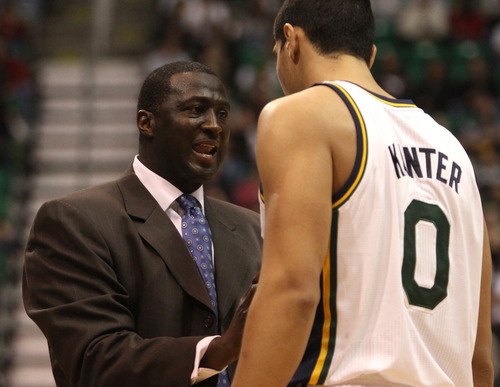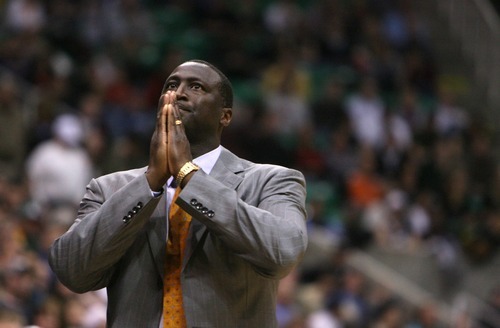This is an archived article that was published on sltrib.com in 2012, and information in the article may be outdated. It is provided only for personal research purposes and may not be reprinted.
Tyrone Corbin has himself a problem.
It's emerged early in this season and it's likely to re-emerge with more force later. It will test his strength and standing and his resolve and position as a head coach, as well as his ability to communicate with his players and his command of the Jazz on the whole: His use of younger players versus his use of veterans.
There's already the making of a division on the team, with some of the more experienced players grumbling about their minutes, about rotations, about coaching decisions.
Raja Bell, an intelligent, articulate, strong-willed oldster, is frustrated with his role. Corbin was asked about that on Wednesday, and his response was: "Ask him about it."
Corbin has to be on this, all over it. He can't waffle or waver, even as he's still trying to figure out what he's got with this group. He has to have the courage to tell his vets to fall in line and do what he expects of them … namely, play hard when they are called upon, no matter whether they start or come off the bench, whether they play 40 minutes or none.
But he also has to be smart, and communicate clearly with the vets.
Coaching an NBA team, especially this particular team at this particular point, is not a democracy, is not open for debate, is not any kind of nod to seasons already served or seniority of any kind. It is about developing talent in a hurry.
The Jazz have four young lottery picks on their roster — Gordon Hayward, Derrick Favors, Enes Kanter and Alec Burks — who have to be brought along sooner rather than later. Thanks to a flawed system, a system that was left unfixed in the recent labor negotiations, wherein clubs can lose their drafted talent in relative short order on account of free agency, the Jazz are on the clock with their young core.
If they're ever going to make a deep run in the postseason, not nibble around the edges as a seventh or eighth seed, they'll have to make the most of that core. That's not to say Corbin can't effectively utilize Paul Millsap, Al Jefferson, Josh Howard, C.J. Miles and Bell, but it is to say that those guys gobbling up most of the significant minutes is counterproductive to the ultimate goal.
Again, Corbin has to make this clear.
Players want to know what their roles are. They want, as John Stockton and Karl Malone did, to have some predictability to when they're going to play and when they're not. You could set your watch to Stockton's pattern of subbing out and in, especially during his later years.
The Jazz were a more established outfit at that juncture. But even then, Jerry Sloan used to leave some of his usable assets on the bench for weeks at a time … and, then, call on them to play pivotal roles in big games, nearly out of the blue.
"That's part of being a pro," he said after a playoff win against the Lakers. "Be ready to play when you get your chance."
He repeated that sentiment a million times, even as the Jazz were one of the most stable and best teams in the league.
Now, they are far from that. They are unfinished. They might as well have orange barrels placed around them as cement mixers dump fresh loads of concrete in place and steamrollers flatten the surface. Road construction is definitely in progress here.
That's why Corbin has to not only be a coach with a strong sense of self, but also a man with a plan. He has to be … da man.
Some veterans are going to moan and groan. They're going to complain to their agents. A few might even sport bad attitudes and want a trade. So be it. Talk it through. But if Corbin sees any of these guys dog it on the floor or attempt to poison the youngsters in the locker room, he should nail their butts to the bench.
Even Sloan, after 20-plus years of coaching and a Hall of Fame induction, was susceptible to the push of designing players. But he was tired and no longer wanted to fight that fight.
Corbin has to fight it. That doesn't mean he should be a jackass, or be inordinately stubborn or unwilling to better learn his craft. He just has to figure the plan, communicate it, and work it — without worrying about dissension.
This season is unique and important for the Jazz, not because they will win a lot of games or be a threat in the playoffs, but, rather, because the roadway they lay down now will set them on their ride for the next four seasons — and maybe beyond that. And if they pick up another lottery selection in the coming talent-rich draft en route, that will hurt them not at all.
Corbin is the key here.
He's bound to make some mistakes and he should confess and correct them. The veterans might have some healthy input along the way. If Raja, or anyone else, is unhappy, Corbin can hear him, or them, out. But he has to go young, at least over some crucial stretches. Development is Job One this season. It has to be.
If it's done right, winning will come soon enough.
GORDON MONSON hosts "The Gordon Monson Show" weekdays from 2-6 p.m. on 97.5 FM/1280 AM The Zone. Twitter: @GordonMonson. —
Memphis at Utah
P Friday, 7 p.m.
TV • ROOT Sports





